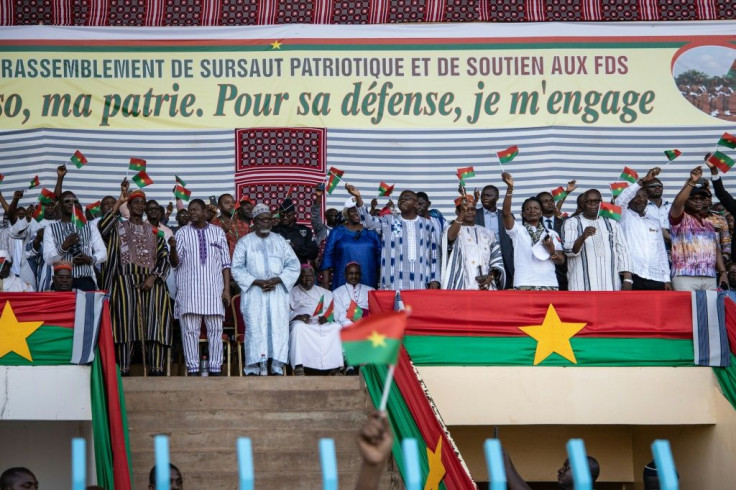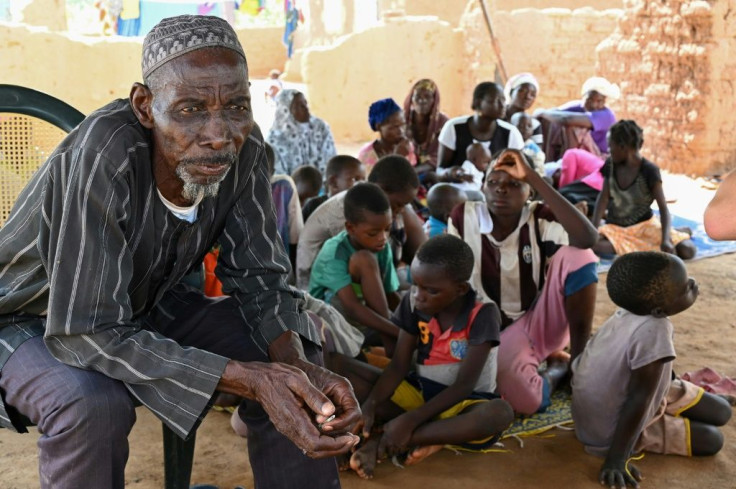Burkina's Anti-jihad Volunteers Stir Praise And Controversy
To some, they are doughty fighters who with meagre resources put their lives on the line.
To others, they are an undisciplined band -- a "death squad," according to one -- that has carried out summary justice and inflamed ethnic tensions.
The force at the heart of this controversy is the newly-created Volunteers for the Defence of the Homeland (VDP, to use their French initials), a militia fighting jihadist raiders who have sown terror in rural Burkina.
President Roch Marc Christian Kabore unveiled the idea of the VDP last November as the shocked Sahel nation mourned the massacre of dozens of people in an ambush in Semafo.
They were the latest victims of a jihadist insurgency that began in neighbouring Mali and now casts a shadow over states to the south.
In Burkina Faso, one of the poorest countries in the world, more than 1,100 lives have been lost and nearly a million people forced from their homes.

On January 21, after another bloody attack, parliament approved a law creating the VDP.
Under it, citizens who join the VDP undergo 14 days of military training, are equipped with light arms, communication and observation equipment, and carry out surveillance and protection missions.
They are unpaid, although each local unit receives 200,000 CFA francs ($350, 300 euros) a month to pay for petrol and other operating expenses, according to VDP members.
Volunteers often also get help from local people and monetary tips from traders or others they escort.
"We were fed up getting slaughtered like chickens," says "Rambo," a 32-year-old farmer who joined the VDP in Kongoussi, in northern Burkina Faso.
"We had the choice of sitting back and watch death come to us or to confront it head on, hoping that we could at least save our families, our villages. We prefer to fight."

Commentators say the VDP is both a symbol of the weakness of the armed forces and de-facto recognition of unofficial militia that existed before.
"Recruiting volunteers sounds like an admission of the inability of the FDS (defence and security forces) to ensure the defence of the country by themselves," a local grassroots group, the Observatory for Democracy and Human Rights (ODDH), said.
Drissa Traore, a specialist in Burkina Faso, said the authorities "found a compromise between institutionalising (armed) groups and dissolving them."
Self-defence groups proliferated in rural Burkina Faso after 2015.
These "koglweogos" -- Guardians of the Bush in the Moore language -- sprang up in several regions, notably to fight criminal gangs.
They have often been accused of torture, extortion and summary justice, but were also popular.

Government reports about jihadist attacks persistently report the presence of the VDP at these incidents -- a clear sign that the battered, under-equipped and poorly-trained armed forces are making extensive use of the group.
Lieutenant Colonel Mohamed Emmanuel Zoungrana, a commander in a northern sector, said, "If we had enough numbers... we wouldn't have to call on the VDP."
"The army has been unable to recruit 10,000 or 5,000 people each year. This initiative helps us to compensate for that."
The VDP are most useful in providing information and in their knowledge of local terrain, said Zoungrana.
"They can't be expected to be super-fighters. That said, we have seen their courage and fighting spirit on the ground, and the results have been satisfactory."
The death toll among the volunteers is high.
More than 100 have been killed so far this year, according to "Rambo," and others have been murdered in their villages by jihadists for perceived collaboration with the army.
A retail worker who is a VDP member in central-northern Burkina said the auxiliaries in his area were mainly used as escorts for senior officials or convoys, but had also "helped dismantle terrorist bases."
"Before we launch any operation, we inform the army and ask their opinion," he said.
The fight against jihadists has led to mounting accusations against the armed forces -- and now the VDP -- of summary executions of civilians, especially of the Fulani, also called Peul, ethnic group.
Moctar Diao of another rights monitor, the Observatory for Human Dignity, says there are cases when the VDP have acted as "death squads, sowing desolation and fear under the cover of fighting terrorism."
Among the incidents, "volunteers from Namsiguia (in northern Burkina) were identified as the killers of nine people who died in Boulsi-Baogo.
"In early June, two school students were picked up and executed in cold blood by the VDP Tanwalbougou."
He added: "When they (the VDP) operate alongside the army, it's OK, but when they are left to themselves, they rule the roost in areas which have been abandoned (by the government).
"They extort businesses and the public, they rustle cattle, and people are unable to complain."
Newton Ahmed Barry, a journalist who is president of the country's National Electoral Commission, said that in some regions, Fulani people were excluded from volunteering from the VDP, when their contribution could be a trump card.
Zoungrana said the army was taking "every measure" to avert abuses and saw the VDP as playing a crucial role.
"If the VDP, with good recruits and supervision, and the FDS covered lots of terrain and closed down the corridors where the enemy move around, victory would be assured."
© Copyright AFP 2024. All rights reserved.





















